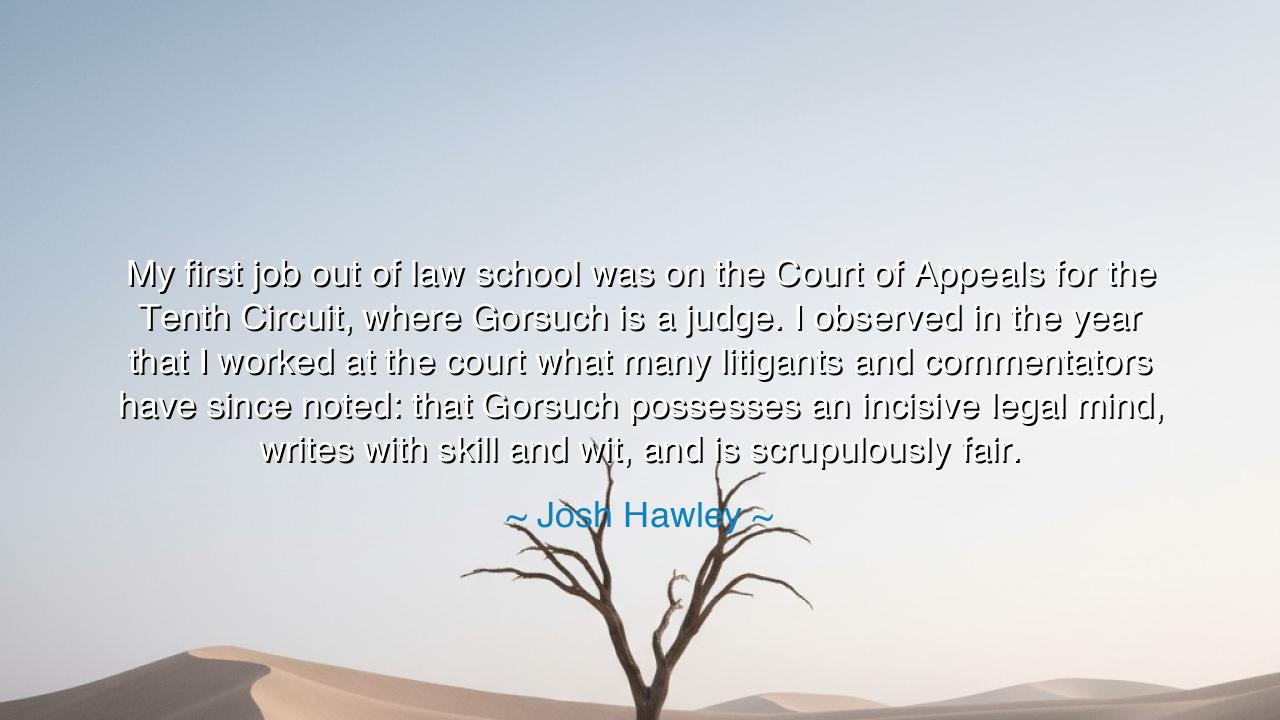
My first job out of law school was on the Court of Appeals for
My first job out of law school was on the Court of Appeals for the Tenth Circuit, where Gorsuch is a judge. I observed in the year that I worked at the court what many litigants and commentators have since noted: that Gorsuch possesses an incisive legal mind, writes with skill and wit, and is scrupulously fair.






When Josh Hawley said, “My first job out of law school was on the Court of Appeals for the Tenth Circuit, where Gorsuch is a judge. I observed in the year that I worked at the court what many litigants and commentators have since noted: that Gorsuch possesses an incisive legal mind, writes with skill and wit, and is scrupulously fair,” he spoke as both witness and disciple — a young observer who had glimpsed the workings of a great judicial mind. His words carry the quiet reverence of one who has stood in the presence of mastery and learned from it. They remind us that true wisdom is not only the product of intellect, but of integrity, and that the finest judges are those who wield reason and fairness as twin instruments of justice.
The origin of this statement lies in Hawley’s early career as a law clerk on the Tenth Circuit Court of Appeals, one of the thirteen appellate courts of the United States. It was there that he encountered Neil Gorsuch, long before Gorsuch’s rise to the Supreme Court. What Hawley witnessed in that chamber was not merely the crafting of opinions or the weighing of legal arguments — it was the art of judgment itself. The phrase “incisive legal mind” reflects a precision of thought that cuts through confusion, a quality that distinguishes great jurists from mere technicians of the law. For to be incisive is not only to analyze, but to see to the heart of truth.
In describing Gorsuch as one who “writes with skill and wit,” Hawley honors the rare harmony between intellect and expression. Law, after all, is not merely a system of rules but a language of justice, and those who shape it must speak with clarity and grace. The ancients understood this power of word and reason well. Cicero, Rome’s greatest orator, once said that eloquence is the companion of wisdom — for without the beauty of expression, even truth may be lost in noise. In praising Gorsuch’s pen, Hawley reminds us that the written word can both refine and preserve justice, giving form to the abstract spirit of fairness that governs a nation.
Yet, it is the phrase “scrupulously fair” that breathes moral life into Hawley’s recollection. To be fair is not to be neutral, but to be devoted to truth without favoritism, to judge each case by its merit, unmoved by the passions of politics or power. Fairness, in its truest form, is a form of courage — the courage to hold the balance steady when the winds of partisanship blow strong. It is this quality that Hawley saw in Gorsuch and that he now commends to the world: the image of a judge as a servant of principle, not personality.
History has always honored those who exemplify such judicial virtue. Consider Solon, the lawgiver of Athens, who once restructured the city’s laws to protect the poor from the excesses of the powerful. He was mocked by some and praised by others, yet he cared only that the law itself remain just. Or think of Sir Edward Coke, who stood against King James I and declared that even the monarch must bow before the law — an act of fairness that cost him his favor but preserved England’s liberty. Gorsuch, in Hawley’s words, stands within this lineage: one who serves justice as something higher than authority.
There is, too, a subtler meaning in Hawley’s recollection — one of mentorship and legacy. For every great generation of leaders, thinkers, and jurists is shaped by those who came before. The young clerk, watching his judge write with wit and reason, learns not only law but discipline, humility, and the sacred responsibility of judgment. And in time, he too must carry those lessons into his own service. Thus, Hawley’s words are not merely praise for Gorsuch; they are an acknowledgment of the eternal chain of learning that binds the teacher and the student in the pursuit of justice.
Let this, then, be the lesson passed down: that skill without fairness is hollow, and wit without wisdom is dangerous. The true measure of intellect lies not in cleverness, but in conscience. Whether one sits upon a bench, leads a nation, or simply governs one’s own heart, let the example of the scrupulously fair judge be your guide. Seek clarity over confusion, reason over reaction, and truth above all. For as Hawley’s reflection reminds us, the world is shaped not by those who shout the loudest, but by those who think clearly, speak justly, and judge rightly — the eternal guardians of justice who, in every age, keep civilization from collapsing into chaos.






AAdministratorAdministrator
Welcome, honored guests. Please leave a comment, we will respond soon